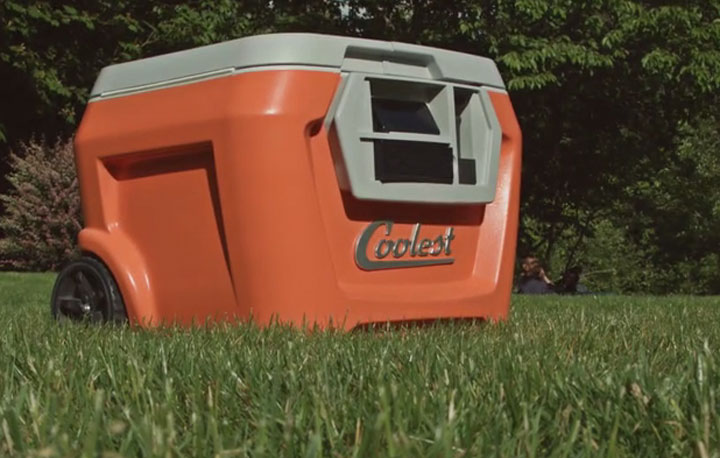TORONTO – For more than two years the Canadian-made Pebble smartwatch has been a shining example of how crowdfunding can launch entrepreneurs into full-blown success.

Since raising over $10 million on Kickstarter in 2012, Pebble has held its title as the highest-funded project in the history of the site – until now. Turns out, a fully loaded picnic accessory is much “cooler” than a smartwatch.
The “Coolest Cooler,” a high-tech cooler with a massive amount of features, has raised over $11 million in funding in eight weeks, stealing the title of most-funded Kickstarter project right out from under Pebble.
Listen: Why is the ‘Coolest Cooler’ so cool?
What makes a cooler so special, you ask?
Well, not only does it include a number of high-tech features – like a waterproof Bluetooth speaker, a USB charger and built-in LED lights – it has a built-in blender, cutting board, bottle opener, and storage for plates and cutlery.
Like the cooler and Pebble (which connects to iPhone and Android), many top Kickstarter projects have been tech-related despite the fact that in the site’s early years, films were the most popular type of project.
The Ouya gaming console, which earned more than $8 million in funding from over 63,000 backers, is now the third-highest funded project in the site’s history. The Pono music player, which earned over $6 million in funding earlier this year, now takes the fourth spot.
READ MORE: How Pebble thrusted crowd-funding into the spotlight
However, both the Coolest Cooler and Pebble impressed with how quickly they reached their fundraising goals – Coolest Cooler hit its initial fundraising goal of $50,000 in just 36 hours.
Pebble reached a goal of $100,000 in only two hours.
But there are many other tech-based Kickstarters that are setting impressive records in their own ways – some of which are also Canadian.
Little Robot Friends
Created by Toronto-based tech company Aesthetec Studios, “Little Robot Friends” more than doubled its initial fundraising goal in 2013.
The tiny autonomous robots are designed to interact with their human owners with preprogrammed “personalities” that affect how they respond to different stimuli. For example, you can program your robot friend to be afraid of the dark – but if you can teach it to be braver by touching its hair.
The project garnered over $123,000 in funding from just over 1,300 backers, surpassing its initial goal of $55,000.
Chameleon
Chameleon garnered attention on Kickstarter for its customizable Android home screen app, which allows users to set up multiple home screens with app layouts on their smartphone or tablet.
Designed by Ottawa-based Teknision, the project reached its initial fundraising goal of $30,000 in just one day and had earned over $66,000 by the time its campaign ended in July 2012.
However, at the time of this publishing the app only has a three star rating (out of five) on the Google Play Store.
bKey
Montreal-based creators Shaun Teblum and Rob Gold have managed to secure over $52,000 in funding for their cable-free emergency smartphone battery dubbed bKey.
The device looks like a USB key, but consists of a lithium ion battery that can last up to 30 minutes of smartphone use. Users charge bKey through its USB port and plug it into their phone using an adapter.
With eight days left in its campaign, bKey has managed to double its initial fundraising goal of $25,000 through only 1,271 backers.
Alpha
Alpha, a heart rate monitor created by Vancouver-based MIO CEO Liz Dickinson, raked in over $321,000 in funding in 2012.
Dubbed the “holy grail of heart rate monitors,” the device can get an accurate electrocardiography (ECG) reading from the user’s wrist and is accurate at speeds of up to 20 kilometres per hour.
Alpha reached its initial fundraising goal of $100,000 within a week of launching on Kickstarter.


Comments